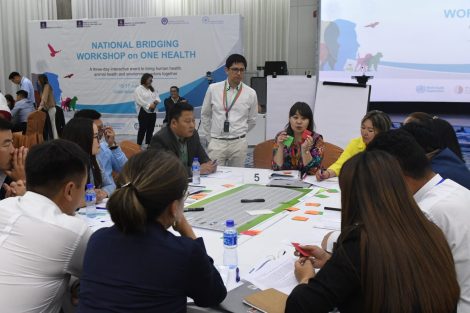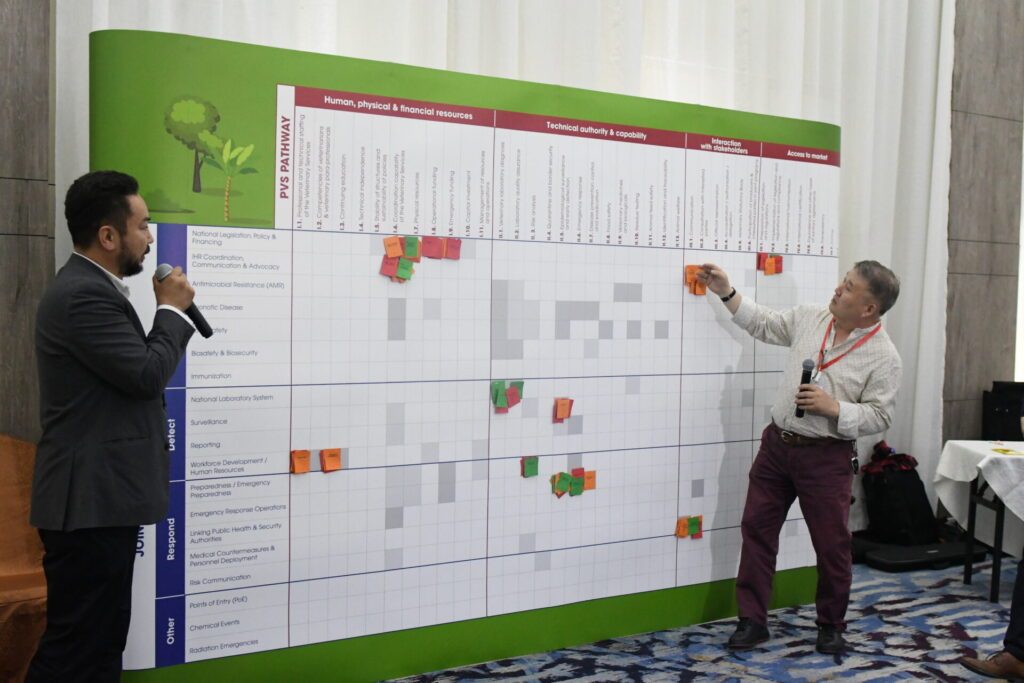One Health capacity building
Intersectoral collaboration is essential for managing health risks at the animal−human interface. Organised in partnership with the World Health Organization (WHO) and the Food and Agriculture Organization of the United Nations (FAO), the National Bridging Workshops aim to foster One Health capacity building and planning at national level, by creating synergies between the animal health and human health sectors.

Bridging capacities between animal and human health services
COVID-19, severe acute respiratory syndrome (SARS) and high pathogenicity avian influenza are examples of how disease events can develop into major outbreaks or pandemics, with significant impacts on public health, animal health and economies. The ability to curb the spread of such diseases relies on the capacity of countries to prevent, detect and respond to health threats at an early stage. Considering that most emerging threats are zoonotic, a country’s capacity to effectively respond is dependent on the coordinated involvement and preparedness of multiple actors from a variety of sectors.
Using a capacity building approach, WOAH has partnered with WHO to develop frameworks and tools to help Members assess the capacities of their animal and human health sectors, respectively, and identify potential gaps in coordination. The final goal is to define strategies to improve compliance with international standards and to support the implementation of a One Health approach.
WOAH and WHO agree that the shared disease risks between animals and humans require advocacy and tools to accelerate collaborative efforts towards compliance with the WHO International Health Regulations (IHR) and WOAH international standards.
IHR-PVS National Bridging Workshops
In partnership, WOAH, FAO and WHO conduct interactive IHR-PVS National Bridging Workshops (NBWs) targeting a truly operational One Health approach at national level.
The workshops bring together dozens of national stakeholders and decision makers from the animal health and the human health services from national, regional and local levels, as well as representatives of other relevant sectors (environment, wildlife, media, police, etc.).
Their aim is to analyse and improve the collaboration between the two sectors so that they can better tackle major health security risks at the animal−human interface, including zoonotic diseases, as well as threats related to food safety, food security or antimicrobial resistance, among others.
Key steps of the National Bridging Workshops:
Brainstorming
Discuss the outcomes of the IHR Monitoring and Evaluation Framework (IHR-MEF) and PVS Evaluation and Follow-Up reports and identify ways to use the outputs.
Advancing One Health
Improve dialogue, coordination and collaboration between animal and human health sectors to strategically plan areas for joint action.
Building sustainable networks
Strengthen intersectoral collaboration through improved understanding of respective roles and mandates.
Fostering strategic planning
Inform planning and investments based on a structured and agreed identification of needs and options for improvement.

PVS expertise building capacity in the human health sector
The equivalent to the PVS Evaluation in the area of human health is the WHO Joint External Evaluation (JEE), which is also based on an independent assessment of a country’s capacity to comply with the IHR.
In countries where PVS missions have taken place, PVS Experts participate in JEE missions, bringing additional expertise related to zoonoses, food safety, antimicrobial resistance, real-time surveillance, laboratory capacity and workforce development to the table.
How can national Veterinary Services be involved in NBWs as part of the PVS Pathway ?
Interested Members can contact our Headquarters and the relevant WOAH Regional Representation to express their interest.
More information
-
IHR-PVS Participant Handbook
-
WHO web portal on National Bridging Workshops
-
The collaborative framework built through the IHR-PVS National Bridging Workshop Programme – WOAH Bulletin
-
Building One Health Preparedness Capacities: Implementation of the National Bridging Workshop Roadmap in Kazakhstan (who.int)
-
WHO-WOAH Operational Framework for Good governance at the human-animal interface: Bridging WHO and WOAH tools for the assessment of national capacities
